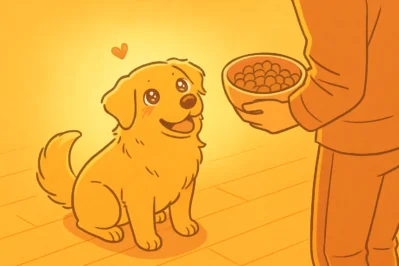Feed Your Pet Like a ‘Golden’ K-Pop Star!
Hello! Welcome to [Meil Hangeul], where we upgrade your Korean skills one fun lesson at a time!
Do you have a furry friend at home? Today, we’re learning essential Korean phrases for taking care of your pet, specifically how to talk about feeding them! You’ll be able to use these phrases with your Korean friends or family who share a home with a pet.
And guess what? We’re going to connect this to a super hot trend in Korea right now! You’ve probably heard the song “Golden” by HUNTRX from the K-pop Demon Hunters OST. It even hit #4 on the Billboard Hot 100! Just like that song is “golden,” our pets are our precious, golden treasures. So let’s learn how to care for them in Korean!
Core Expressions
Here are some key phrases you need to know when it’s mealtime for your pet!
- 한국어 표현: 밥 줬어?
- 발음 [로마자]: Bap jwosseo?
- 영어 뜻: Did you feed (him/her/it)?
- 상세 설명: This is a very common and casual way to ask if someone has fed the pet. ‘밥 (Bap)’ means rice or a meal, and ‘줬어? (jwosseo?)’ is the past tense of ‘to give.’ You can use this with friends and family.
- 한국어 표현: 배고픈가 봐
- 발음 [로마자]: Bae-go-peun-ga bwa
- 영어 뜻: I think (he/she/it) is hungry.
- 상세 설명: Use this phrase when you see your pet acting hungry (e.g., whining, staring at their bowl). ‘배고프다 (baegopeuda)’ means ‘to be hungry,’ and the ending ‘-ㄴ/은가 봐 (-n/eun-ga bwa)’ is used to express a guess or assumption based on what you see.
- 한국어 표현: 사료
- 발음 [로마자]: Sa-ryo
- 영어 뜻: Pet food / Kibble
- 상세 설명: This is the specific word for dry pet food. While ‘밥 (bap)’ can be used generally for a pet’s meal, ‘사료 (saryo)’ refers directly to the kibble you buy in a bag.
- 한국어 표현: 간식 줄까?
- 발음 [로마자]: Gan-sik jul-kka?
- 영어 뜻: Should I/we give a treat?
- 상세 설명: ‘간식 (Gansik)’ means ‘snack’ or ‘treat.’ The ending ‘-ㄹ/을까? (-l/eulkka?)’ is used to make a suggestion or ask for an opinion. It’s perfect for when you want to spoil your pet a little!
Example Dialogue
Let’s see how these expressions work in a real conversation!
A: Wow, I can’t stop listening to the K-pop Demon Hunters OST. That song “Golden” is amazing!
와, ‘케이팝 데몬 헌터스’ OST 계속 듣게 돼. “Golden” 진짜 좋다!
B: I know, right? Speaking of our golden boy, did you feed the dog? 밥 줬어?
그치? 우리 골든 보이 얘기가 나와서 말인데, 강아지 밥 줬어?
A: Oh, not yet. He keeps staring at me. 배고픈가 봐.
아, 아직. 계속 나만 쳐다보네. 배고픈가 봐.
B: I’ll give him some 사료 right now. Should I give him a treat, too? 간식 줄까?
내가 지금 사료 줄게. 간식 줄까?
A: Yes, please! He deserves it for being so cute.
응, 줘! 이렇게 귀여우니 받을 자격 있지.
Culture Tip & Trend Analysis
The song “Golden” by HUNTRX isn’t just a hit; it’s a phenomenon! It has multiple versions, including a powerful orchestra version and even a version with traditional Korean instruments (gugak). This shows how a modern trend can blend beautifully with tradition.
This connects to pet culture in Korea! Many Koreans refer to their pets with adorable nicknames like ‘우리 애기 (uri aegi – our baby)’ or ‘댕댕이 (daeng-daeng-i – a cute slang for doggy)’. While they shower their pets with modern toys and gourmet 사료 (saryo), the deep-seated love and affection for animals is a timeless part of the culture.
So, when you use today’s phrases, you’re not just speaking Korean; you’re participating in a culture that sees pets as precious, “golden” family members—as treasured as a #1 hit song!
Let’s Practice!
Time to check what you’ve learned. Let’s see if you can be a great pet-sitter in Korean!
1. Fill in the blank:
Your cat is meowing and rubbing against its food bowl. You turn to your friend and say:
“고양이가 __________. (I think the cat is hungry.)”
(Answer: 배고픈가 봐)
2. Make a sentence:
You want to ask your roommate if they’ve already given the dog its kibble. How would you ask? (Use ‘사료’ and ‘줬어?’)
(Answer: 강아지 사료 줬어?)
Great job, everyone! You’re one step closer to sounding like a native speaker.
Now it’s your turn! Do you have a pet? Try leaving a comment below telling us about them using one of the phrases you learned today! See you in the next lesson






